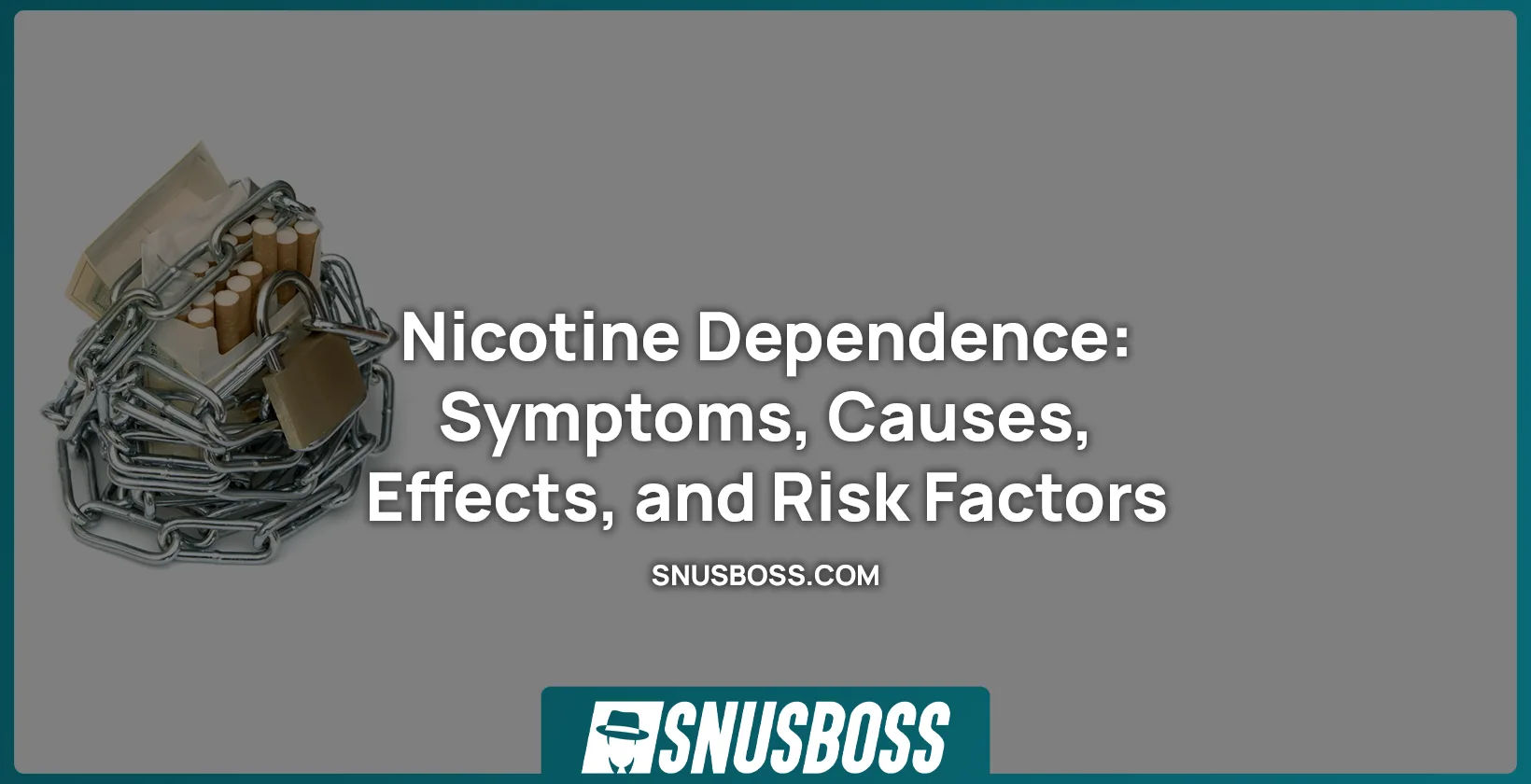Nicotine dependence is a newly recognized illness. Some time ago using nicotine products was only seen as a recreational activity without harmful side effects. Nicotine dependence means that you have difficulties with stopping the consumption of nicotine products.
Nicotine usage causes the body to produce dopamine, a feel good hormone, but it is a temporary reaction that the body will want to reproduce and that causes cravings for more nicotine. Nicotine dependence causes physical and psychological symptoms. Those symptoms make it difficult to stop consuming nicotine even if the person wants to do it.
There are some risk factors (age, peers and family, mental illnesses, substance use, genetics) that make a person more likely to become dependent on nicotine. Signs that help you recognize if you are addicted to nicotine are: the urge to use nicotine products 30 minutes after waking, using nicotine products at regular intervals throughout the day. When you feel like you have a problem with nicotine addiction you should talk to the doctor, who can help you with overcoming it.
What is Nicotine Dependence?
Nicotine dependence is when physical and psychological factors make it difficult to stop using nicotine, even if the person wants to quit. Nicotine use causes feelings of pleasure and alertness, but people with nicotine dependence become tolerant to the desired effects so they need to use nicotine products that are stronger and use them more often. They may no longer experience the pleasure from using nicotine, but they continue to use it because they have cravings and want to avoid nicotine withdrawal.
What is Nicotine?
Nicotine is an addictive stimulant drug that speeds up the central nervous system (CNS), messages that travel from the brain to the body and the other way. At the same time nicotine has a relaxing effect, it relieves anxiety and stress. Nicotine is the main psychoactive component in tobacco products. Nicotine is a colorless to light yellow or brownish liquid. Nicotine is photosensitive and products that contain nicotine should be kept away from direct sunlight. Read more about what is nicotine.
Why is Nicotine Addictive?
Nicotine is addictive because of the nicotine user’s physical and mental reaction to the nicotine. Since the body’s reaction to nicotine is temporary then the body will crave for it to happen again. Physically the user’s body craves for the release of feel-good hormones that nicotine helps to produce, and mentally the person consciously desires for nicotine’s effects. Nicotine addiction happens at different times- after a single usage but it can also take weeks or months. The reaction to nicotine depends on the user’s mental and physical state. Nicotine’s strength plays a key role in the addiction, the more nicotine you consume the more likely you are to become addicted to nicotine.
What are the Symptoms of Nicotine Dependence?
Listed below are the symptoms of Nicotine Dependence
- You are not able to stop using nicotine products. You have made one or more serious attempts and failed.
- You have withdrawal symptoms when you have tried to stop using nicotine products.
- You have developed health problems connected with nicotine usage and still have not stopped using nicotine products.
- You give up other activities (social life) that limit your usage of nicotine products.
What are the Causes of Nicotine Dependence?
Nicotine dependence is caused by a nicotine user’s physical and mental reaction to the nicotine. Physically the user’s body craves for the release of feel-good hormones and mentally the person consciously desires for nicotine’s effects. Nicotine addiction can be caused by single usage but it can also take weeks or months, it all depends on the user’s reaction to nicotine. The reaction to nicotine depends on the user’s mental and physical state. In addition to that the strength of nicotine will also play a key role in the addiction. There are also some risk factors that make the person more likely to become addicted to nicotine.
What are the Effects of Nicotine Dependence?
- The effects of nicotine dependence are that your brain craves for feel good hormones that nicotine helps to release quicker.
- It can cause physical and psychological complications until you get the next dosage and then the cycle begins again.
What are the Complications of Nicotine Dependence?
The complications of nicotine dependence are:
- Anxiety is a feeling of worry, nervousness, or unease about something with an uncertain outcome.
- Depression is a mix of feelings of severe despondency and dejection.
- Difficulty concentrating is when you can’t think clearly, focus on a task, or maintain your attention.
- Impaired performance is acting in an imperfect or weakened state or condition.
- Irritability, frustration and anger are emotional processes that are characterized by a tendency to experience negative affective states
- Restlessness and impatience are the psychological states of being irritated or annoyed.
- Increased appetite and weight gain is when you eat more than you used to without changing other habits(exercising) and you weigh more than you used to without any other conditions changing (pregnancy, working out)
- Cravings are a powerful desire to eat something.
- Sleep disturbances, such as insomnia or sleeping too much are changes from your usual sleeping habits.
What are the Risk Factors of Nicotine Dependence?
The risk factors of nicotine dependence are:
- Age: at what time you start to use nicotine products.
- Genetics: how your genes make your body react to the consumption of nicotine.
- Family and peers: how nicotine usage is normalized by your family and friends.
- Depression: how your body produces and reacts to feel good hormones.
- Mental illness: how your body produces and reacts to feel good hormones.
- Substance use: how addictive is your personality.
1. Age
Age influences nicotine dependence risk by what is the age when you start smoking. Adult smokers, who started smoking regularly at age 18 to 20 years were more likely to become nicotine dependent as it is shown in statistics (2021). They were less likely to attempt or intend to quit in adulthood compared with those who started smoking older.
2. Genetics
Genetics determines how receptors in the brain respond to high doses of nicotine delivered to them. It means that if your genetics make you more sensitive to nicotine usage then you are more likely to become dependent on nicotine. For example, if in your family people are genetically coded to react to nicotine stronger and due to that become dependent on nicotine, then you are also more likely to become dependent on nicotine. So how easily you become dependent on nicotine is genetically coded into you.
3. Parents and Peers
Parents and peers can lead to nicotine dependence by smoking themselves. People who see nicotine consumption among their family or friends are more likely to do it themselves as well. Because they see it as an example of action that is normal and can or should be followed. People whose parents and peers have been smoking show bigger numbers in being smokers themselves.
4. Depression
Depression leads to faster nicotine addiction because people who are depressed have a deficit in pleasure hormones. The deficit of feel good hormones causes the people with depression to react to the pleasure hormones, that nicotine helps to produce faster, much more. For getting the pleasure feeling, that they feel less than not depressed people, they consume more nicotine. Among the people who have depression the percentage of smokers is much higher than among people who do not have depression.
5. Mental Illness
Mental illness can lead to nicotine addiction faster because with mental illness the pleasure hormone levels are already lower. The deficit of feel good hormones causes the people with mental illness to react to the pleasure hormones, that nicotine helps to produce faster, much more. For getting the pleasure feeling, that they feel less than mentally healthy people, they consume more nicotine. Because of that reaction that they will try to reproduce the addiction is also more likely to happen.
6. Substance use
When you use other substances then you are more likely to have an addictive personality. An addictive personality can make you become addicted to nicotine much faster than an average person would get addicted. People who have other substance use issues report much higher numbers when it comes to nicotine addiction.
How long does it take to become Nicotine Dependent?
People become nicotine dependent at different times – after the first trial or after months of using it. It depends on your body and how it reacts to nicotine. Some people can become dependent after the first try and others are not addicted after the 20th time of using nicotine.
How to Prevent Nicotine Dependence?
First pay attention to your nicotine consumption habits.
Second, use less or weaker nicotine products.
Third, exercise -that lifts dopamine levels naturally.
Fourth, drink lots of water (helps with the cravings).
Fifth, talk to your doctor about the options.
Sixth, find a healthy alternative activity (sudoku).
Seventh, avoid places where people consume nicotine.
Eighth, keep your mind busy (read, listen to music).
How is Nicotine Dependence diagnosed?
Nicotine dependence is diagnosed by the doctor or family physician, who can assess the nicotine usage behavior of their patients in a few minutes, using carefully chosen questions. The CAGE questionnaire is for smoking. The “four Cs” test and the Fagerström Test for Nicotine Dependence are used to help make the diagnosis of nicotine dependence. Those questions help the doctor make the suggestions for a suitable course of treatment.
What are the Possible Treatments for Nicotine Dependence?
- Nicotine replacement therapy (NRT): Effective over-the counter-remedies include patches, gum, lozenges, and sprays. Read more about nicotine replacement therapy.
- Support hotlines: Every state offers free telephone help lines with trained counselors who can help you navigate smoking-related stress. You can call once or repeatedly, and your conversation is confidential. The number is 800-QUIT-NOW (800-784-8669). The U.S. Department of Health and Human Services also offers a Smoking Quitline at 877-44U-QUIT (877-448-7848).
- Web, text, or social media-based interventions: You can use social media accounts to help yourself quit using nicotine.
- Antidepressants: Bupropion changes the way your brain processes feel-good chemicals.
- Varenicline (Chantix): This prescription medication helps your brain release the same chemicals that nicotine does.
- Cognitive behavioral therapy (CBT): Cognitive behavioral therapy an help you recognize the thoughts, situations, and people that trigger your nicotine use.
- Motivational interviewing: A counselor helps you understand what’s stopping you from quitting and what will motivate you to make healthy changes.
- Mindfulness: Mindfulness helps you understand your feelings, thoughts, and cravings that might cause you to use nicotine again.
- Acupuncture: needle’s therapy.
- Hypnotherapy: changed state of awareness.
Do Nicotine Pouches Lead to Nicotine Dependence?
Yes, nicotine pouches lead to nicotine dependence. Everything that contains nicotine can lead to nicotine dependence because nicotine is an addictive substance. Using nicotine pouches is a safer and healthier option than smoking, vaping and snus. Read more about nicotine pouches.
Do Vaping users become Dependent on Nicotine?
Yes, vaping users become dependent on nicotine. When you vape, you inhale nicotine and nicotine is an addictive substance. But in addition to consuming nicotine, you inhale smoke which is a cause for a lot of health troubles. Nicotine pouches are a healthier option than vaping.
Does Smoking cause Dependence on Nicotine?
Yes, smoking causes dependence on nicotine. When you smoke you consume nicotine and nicotine is an addictive substance. But in addition to consuming nicotine, you inhale smoke and tobacco which are the cause for a lot of health troubles. Nicotine pouches are a healthier option than smoking.
What is Nicotine Withdrawal?
Nicotine withdrawal is the physical and psychological symptoms you feel when nicotine leaves your body. You can feel the urge for nicotine, irritation, frustration, and have trouble with sleeping and concentrating. These feelings may last for 2 – 4 weeks and the height of it will be 3- 7 days after quitting. Read more about nicotine withdrawal.





